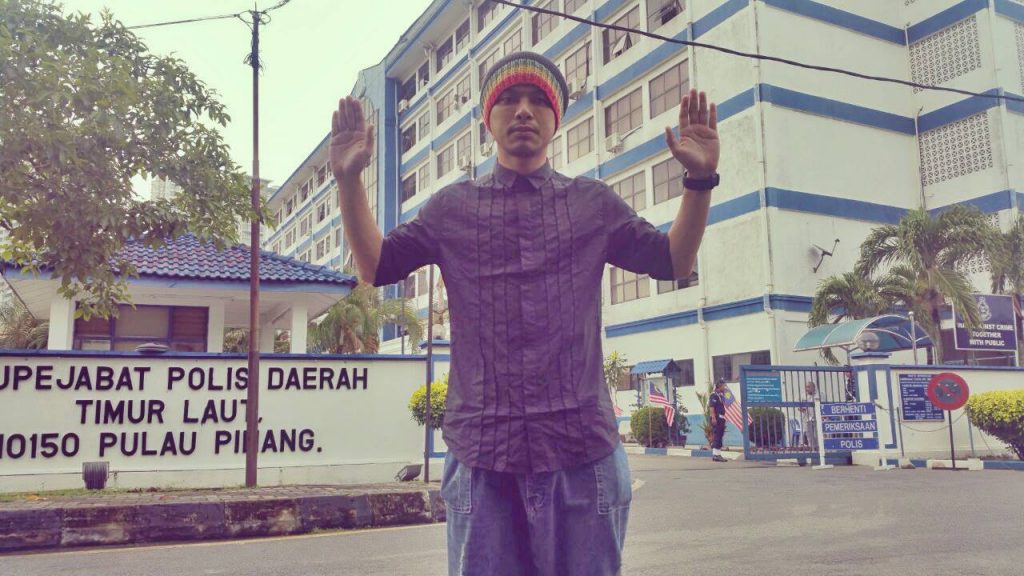by Brian Hioe
語言:
English
Photo Credit: Namewee/911
A RECENT MUSIC VIDEO titled “Oh My God” by Malaysian rapper Namewee and well-known Taiwanese hip hop group 911 has drawn controversy for its depiction of Muhammad, gambling, drinking, and carrying a toy gun. 911 was most recently a finalist in competition for best singing group at this year’s Golden Melody Awards and is slated to be the spokesmen of the Taiwan Universiade, though this has been affected by the controversy and it is now questioned whether the group will be replaced. Namewee was also a nominee at this year’s Golden Melody Awards.
Controversy in Taiwan occurred after YouTube personality DREAM清醒夢LUCID, whose real name is Christopher Hall, would later issue a video condemning the video. In his video, DREAM清醒夢LUCID condemns the video for risking offense of Muslims and giving Taiwan a bad name, as well as raising the possibility of violent retaliation to Taiwan because of the video.
A version of the “Oh My God” music video closer to the original posted on YouTube
Since the release of Hall’s video, it has become a divisive issue as to whether 911 has in fact damaged Taiwan’s reputation in the international sphere, or whether 911 was entitled to their portrayal of Muhammad in the name of freedom of speech or freedom of expression. The video is an irreverent one, featuring Muhammad, Jesus, the Buddhist monk Xuanzang, and a Daoist master, poking fun at them all. It does not appear that Muhammad is specifically singled out in the video, however, it is that usually interpreted as that Islam prohibits the depiction of Muhammad, although this is not actually mentioned in the Koran, and gambling and drinking are considered sins within Islam.
Seeing as his native Malaysia is a majority Muslim country, it seems unlikely that Namewee would not have known that fact. It is, in fact, sometimes questioned as to whether Malaysia is a secular state or an Islamic one given the strong influence of its majority Muslim population, this being a controversial issue within Malaysia itself. There has been some confusion in news coverage regarding the “Oh My God” music video as to who exactly is offensive figure depicted because while the video seems to depict Muhammad, Hall’s co-host in his video seems to mistakenly claim that it is a depiction of Allah featured in the video. As of August 28th, the video no longer appears on Hall’s YouTube channel, however, it seems because of a copyright claim against the video by 911 or its management.
A History of Controversy From All Involved Parties
THIS WOULD NOT be the first time 911, Namewee, or Hall have been involved in controversy. 911 previously came under fire for a music video lashing out at foreigners in Taiwan, which featured a number of racist stereotypes of foreigners—including actors in blackface—which was responded to by expat YouTube personality Avalon Celeste. A video released by Hall capturing his being harassed for being a white person by a Taiwanese man while on the subway became a hotbed issue last year, raising questions about the position of white people in Taiwanese society, and attitudes by Taiwanese towards white expats. Many of those for whom the “Oh My God” video or Hall’s reaction video has provoked strong reactions do not actually seem to have noticed that Hall is the same individual from the “subway racist” video last year, however.
 Namewee. Photo credit: Namewee Facebook
Namewee. Photo credit: Namewee Facebook
Likewise, Namewee is no stranger to controversy in his native Malaysia, having in the past caused a national incident through releasing a rap parody of the national Malaysian anthem while he was studying in Taiwan in 2007. Namewee’s rap parody of the Malaysian national anthem criticized Malaysia for discrimination against ethnic Chinese by the government and police, Namewee himself being Malay Chinese. As part of this, Namewee’s rap parody lashed out against Malays in explicitly racialized terms in claiming that Malays are lazy and Malay Chinese hardworking, but that Malay Chinese are undeservedly punished by the government. Regardless of Namewee’s views on Malays, official government policy strongly favoring the majority Malay population have been criticized by human rights advocates in the recent past, as well as a longer history of anti-Chinese race riots.
This video provoked strong controversy in Malaysia, with cabinet members expressing outrage and reports of Namewee and his family suffering harassment by the Malaysian police afterwards. Namewee has also been made to sign gag orders in the past, promising not to offend either the Malaysian government or Chinese government, and Malaysian police have attempted to restrict media coverage of Namewee. Malaysia is a country not exactly known for a good human rights record where police persecution of political dissidence, and repression of religious freedoms, sexual freedoms, or freedom of expression is concerned, as justified by a wide-ranging Sedition Act and the use of coercive measures by police. Indeed, the act was used against Namewee for insulting symbols of the Malaysian nation in his rap parody video. However, Namewee has won his fair share of young Malaysian fans as result of these controversies, who may admire his stances.
Discussion of the music video has primarily focused on 911 within Taiwan, with Hall claiming that 911 probably was not internationally oriented enough to realize their actions were offensive and that they were led astray by Namewee, given this past history of controversy. Hall also claims that unlike the Taiwanese 911, Namewee does not hail from a primarily racially homogeneous society, and so Namewee would realize the potential of his video to offend in a way that 911 would not realize.
 911. Photo credit: 911 Facebook
911. Photo credit: 911 Facebook
911 has, for its part, released a video stating that they were not aware of the full offensive nature of the video and that they were merely following Namewee’s directions, but not exactly retracting the video either. 911 has also stated that they understood the message of the video as being that religions should not be divisive and that unity is possible, as reflected in the lyric “One world, one peace.” 911’s management at Ainoko-Production Inc. has issued a statement that they requested the music video’s production company remove the scenes depicting religious figures in the video, but that an earlier version of the video was leaked online. However, given that the scenes with religious figures comprise close to half of the music video, reportedly shot over four days in Malaysia, this explanation seems unconvincing. Ainoko-Production Inc. has also not ruled out a lawsuit against Hall for his video criticizing the “Oh My God” video, lending credence to that Ainoko-Production Inc. is behind the copyright claim that led to Hall’s video being taken down. Nevertheless, this apology video by 911 would also seem to be removed from 911’s Facebook page as of August 28th.
A Failure To Notice Namewee’s Detention By Malaysian Police By Commentators And News Media In Taiwan
YET AS A RESULT, whether from 911, Hall, or others, notably little attention has been drawn to the fact that after the release of the video, Namewee would be detained by Malaysian police for four days. Apart from being facing charges from authorities for “insulting Islam” in his video, Namewee was also reported as having filmed the video on a mosque without securing permission. Reports in early August began circulating police were seeking Namewee’s arrest after filming the “Oh My God” music video, though Namewee was not in Malaysia at the time. After such reports began to circulate, Namewee would release a video similarly stating that the message of his video was one of peace and unity, claiming that he did not mean to disrespect religion but rather to show its importance to people’s lives. In this video, Namewee seems to try to distance himself from the claim that the character in the video is Muhammad, claiming that the character is just a “Arabic man” and that the other characters in the film apart from Jesus were generic Buddhist and Daoist figures not meant to be any specific individual.
Given his record of past harassment by the police and the practice of torture by the Malaysian police, before returning to Malaysia, Namewee would film and release a video of himself stripping fully naked to show that he had no existing injuries. The use of torture is not illegal in Malaysia. After his return to Malaysia, Namewee was quickly detained at the airport, and was held for four days before courts ruled that Namewee could not be further detained—though police sought to prolong his detention nonetheless. Namewee’s detention by police was not mentioned in either Hall’s video criticizing Namewee and 911 or 911 itself in its video released in response to criticisms, but Namewee would later issue a statement asking individuals not to go after 911 and stating that he is to blame for any controversy.
Hall’s video attempts to criticize yet absolve 911 by claiming they were primarily led astray by Namewee for the video, but do not mention anything about Namewee’s detention. 911’s video also does not mention Namewee’s circumstances, despite that both videos were released after Namewee was taken into custody by police. Thus, perhaps much discussion of the “Oh My God” music video has largely missed a major issue at hand because of the failure of individuals to note Namewee’s detention. Hall himself flagged the Charlie Hebdo incident as an obvious precedent, raising that the video is a precedent illustrating the potential dangers of a sacrilegious depiction of Islam.
This would be another incident in which questions about whether there should be limitations on freedom of expression because of the potential to offend, it seems. We may note that in similar instances—for example, with YouTube blogger Amos Yee facing legal charges in neighboring Singapore for disrespecting government symbols and for making religiously offensive statements against Christianity and Islam—such individuals have been praised for standing up for free speech in Taiwan and elsewhere. But this has not occurred in the case of Namewee.
Questions of How Far Freedom of Expression Should Go?
OF COURSE, the question to be asked here is that while offensive representations may be problematic, do they justify severe actions such as imprisonment or even death? In particular, Hall seems to raise the Charlie Hebdo incident abstractly as showing something about the dangers of offensive representation, but without taking a clear stance on how far he thinks limitations on freedom of expression should go. Again, while not addressing Namewee’s detention by Malaysian police to begin with, to dismiss justification of the video on grounds of freedom of expression, Hall claims that the “Oh My God” video is invalidated from being justified on these grounds because he perceives as the video being meant only for crass offensive value and in that way lacking artistic merit, as well as what he perceives 911’s lack of musical skill.
 Still from the “Oh My God” music video
Still from the “Oh My God” music video
But this would be Hall’s personal judgement as to what he sees as the artistic merit or lack thereof of the “Oh My God” video or the talent or lack thereof of 911 as a musical group. He extrapolates this to be an objective evaluation of the video, as justifying its validity or lack of validity to circulate in the public sphere, but who is any one individual to judge as to what people at large perceive as worthwhile or artistic, much less to decide that something should not exist in the world on the basis of that judgment? For example, do we justify the Malaysian government’s persecution of those who disrespect the symbols of the Malaysian nation on similar grounds, because it apparently does not find the disrespect of its national symbols very worthwhile or artistic? Or if the Malaysian state is one which, in fact, cracks down criticism of the government quite often by claiming it is disrespectful to organized religion, whether Islam or any other religion?
And to begin with, though some have seen Hall’s stance as a principled one in defense of Taiwan’s reputation abroad and the possibility of offending Taiwan’s minority Muslim population, along with his co-host Hall spends something like close to half of his video commenting on how the “Oh My God” video poses risks to Taiwan’s safety—as interspersed with various images of destruction from past incidents in which religious offense has led Muslim individuals to commit acts of violence in England and elsewhere. In this vein, Hall also raises that ISIS has seemingly included Taiwan in its list of enemy countries in past propaganda videos.
But, in railing abstractly at length about this possible threat to Taiwan from the “Oh My God” video—not actually just the threat of damaging Taiwan’s reputation abroad but largely revolving around the possibility of the video leading to terrorist acts being committed against Taiwan that lead to the loss of life—is the suggestion that it is more than a tiny minority of Muslims worldwide who take up arms and commit violent acts in the name of fundamentalist religion? One wonders. If so, Hall’s understanding of Muslims is not actually so different from mainstream western media in more or less thinking of Muslims as potential terrorists and little else.
 Picture of Namewee posted on his Facebook page after his release by police. Photo credit: Namewee Facebook
Picture of Namewee posted on his Facebook page after his release by police. Photo credit: Namewee Facebook
There would be no unambiguous answers about right or wrong here. Between Namewee, 911, or Hall, there would also be no unambiguously correct individual, either. Perhaps there is something problematic about offensive depictions of Islam, yet there is also something problematic about curtailing freedom of expression for the potential to offend, much less as justifying the use of imprisonment, torture, or—God forbid—killing individuals. In this case, while Hall and his co-host at least commented that they did not condone killing for any cause, imprisonment or torture were possibly on the table for Namewee, but both Hall and 911 themselves skirted around the issue in their responses in not mentioning Namewee’s detention at all. Regarding freedom of speech issues, it would be a further twist that Hall’s video would later be taken down by 911 or its management, except one suspect that the video has already circulated widely enough that this will only reflect negatively on 911 and its management.
However, as with other debates of this kind in recent memory, it would be that most reactions to date have been reflexive in nature and failed to take into account the whole of the situation—most responses failing to note Namewee’s detention by Malaysian police. Sometimes it strikes as that before one flips out in outrage on the Internet—regardless of what position one arrives at in the end—some light Google-ing beforehand would be helpful before making political judgments. Nevertheless, maybe one should not be surprised.

